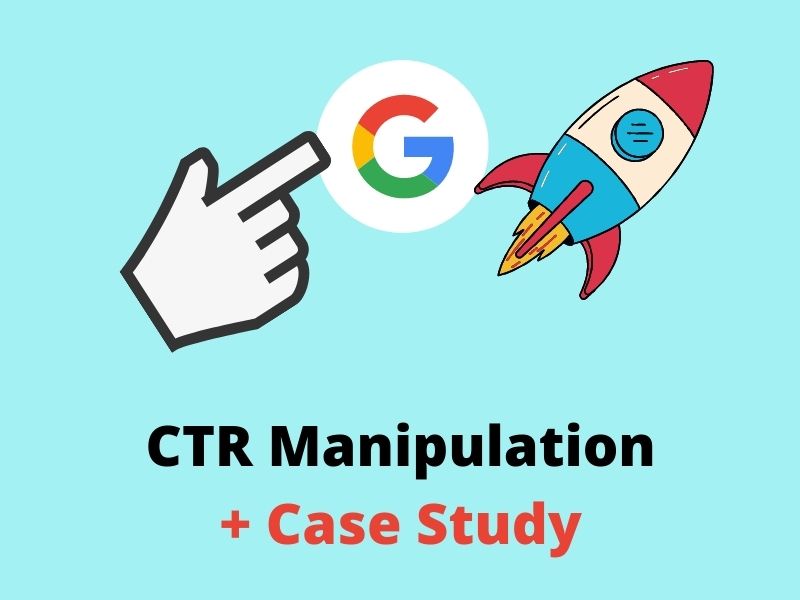GMB CTR Manipulation: Enhance Your Google My Service Rankings
GMB CTR Manipulation: Enhance Your Google My Service Rankings
Blog Article
Discovering the Partnership In Between CTR Adjustment Solutions and Individual Behavior
In the world of electronic advertising, the influence of click-through price (CTR) control services on customer habits stays a complex and appealing topic. As online systems progressively depend on CTR metrics to measure the success of web content, products, and solutions, comprehending how these controlled rates influence user involvement and decision-making procedures is paramount. The interaction between CTR adjustment and user actions raises inquiries regarding credibility, trustworthiness, and the moral implications of such methods. By dissecting the complex relationship in between CTR manipulation solutions and individual actions, appealing understandings emerge that might reshape our understanding of electronic marketing strategies and their impacts on customers.
Influence of CTR Manipulation on Habits
Assessing the impact of Click-Through Rate (CTR) control on customer actions reveals important understandings right into the dynamics of online engagement. CTR control includes unnaturally blowing up the number of clicks on a particular link or ad to trick customers and online search engine. This method can cause an altered assumption of a page's popularity or relevance, ultimately impacting individual habits.

In addition, CTR adjustment can alter the information made use of by formulas to individualize customer experiences. This can lead to individuals being offered material that does not line up with their preferences or interests, ultimately resulting in a decline in user satisfaction and engagement. Understanding the influence of CTR adjustment on customer habits is vital for preserving transparency and rely on online communications.
Customer Interaction With Controlled CTR
User involvement with adjusted CTR data frequently results in manipulated perceptions of on-line web content popularity and relevance. When customers connect with material based on unnaturally inflated Click-Through Fees (CTR), they might think that specific information, products, or services are more prominent or reliable than they in fact are. This can lead to users making choices based on misleading information, resulting in possibly undesirable outcomes.
Interaction metrics like sort, shares, remarks, and time spent on a webpage are usually influenced by CTR manipulation. Individuals may be extra inclined to involve with material that shows up to have higher involvement rates, better continuing the cycle of manipulated understandings. As a result, material creators and advertisers might prioritize generating content that creates high CTR instead of concentrating on creating really valuable and appropriate product.

Mental Effects of CTR Adjustment

Furthermore, the psychological results of CTR adjustment can likewise manifest in transformed decision-making procedures. Customers might be much more inclined to click on content only based upon its perceived appeal, as opposed to its actual worth or significance to their needs. This behavior shift can result in a shallow engagement with on-line material, where individuals might neglect high-quality yet less preferred offerings in favor of those with unnaturally improved CTRs.
Basically, the mental implications of CTR manipulation highlight the value of maintaining openness and credibility in on the internet communications to promote real individual involvement and count on.
Moral Considerations in CTR Adjustment
Considering the moral implications of controling click-through rates (CTR) in on-line platforms is critical for preserving honesty and trust within the electronic ecological community. CTR control elevates concerns regarding tricking users, distorting information analytics, and compromising the trustworthiness of on-line content. One major moral factor to consider is the potential effect on customer freedom and decision-making. By artificially pumping up CTR, customers might be deceived into clicking web links or advertisements they would not have selected or else, bring about a disingenuous online experience. Furthermore, CTR control can alter the performance metrics that services depend on to make strategic decisions, eventually impacting market competitors and customer ctr manipulation service trust fund.
An additional honest element to consider is the fairness of manipulating CTR to gain an unjust advantage over rivals. Participating in such techniques not just breaks principles of fair game yet likewise threatens the trust that users place in on the internet systems. It is necessary for businesses and digital online marketers to promote ethical requirements in their methods to make certain openness, integrity, and long-term sustainability in the online atmosphere.
Implications for Digital Marketing
With the raising reliance on electronic systems for advertising functions, the technique of adjusting click-through rates (CTR) poses substantial effects for the performance and honesty of digital advertising strategies. CTR manipulation can bring about skewed data analytics, misguiding online marketers into believing that their projects are carrying out far better than they really are. This can lead to misallocation of resources, with business purchasing underperforming methods based upon falsified CTRs. Additionally, when customers realize that CTRs have actually been adjusted, it can wear down trust in the brand name, resulting in long-lasting unfavorable repercussions for client loyalty and brand name track record.
In addition, the usage of CTR manipulation solutions can produce an unjust affordable landscape, where companies that participate in such techniques obtain a synthetic benefit over those that stick to honest marketing requirements. This can stifle technology and imagination in digital advertising and marketing, as success becomes more concerning adjustment methods than supplying real value to customers. Ultimately, the implications of CTR adjustment for digital advertising extend past short-term gains, influencing the general sustainability and reputation of advertising initiatives in the electronic world.
Conclusion
To conclude, the partnership between CTR manipulation services and user behavior is complicated and complex. The influence of CTR adjustment on actions, individual interaction with adjusted CTR, emotional effects, honest factors to consider, and ramifications for digital marketing all contribute fit this partnership. Recognizing these characteristics is essential for marketing experts and researchers alike in order to browse the moral implications and maximize the performance of their digital marketing techniques.
Report this page